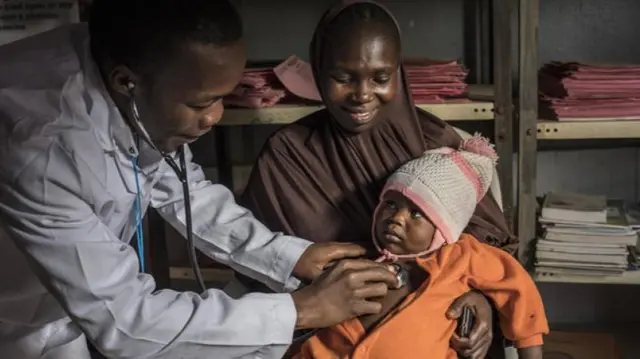
On 16 January 2020, a health worker examines Jorim John, 3, in a health clinic in Yola, Adamawa state, northeastern Nigeria. Pneumonia claims the lives of more than 800,000 children under five every year. Nigerian children made up the highest number of those who died, with an estimated 162,000 deaths in 2018./UNICEF
Two million children in Nigeria could die in the next decade unless more is done to fight pneumonia, the United Nations Children Fund (UNICEF) has said.
The UN body identified malnutrition, air pollution and lack of access to vaccines and antibiotics as the drivers of preventable deaths from pneumonia, which last year killed one child every three minutes in Nigeria.
According to the UNICEF report, over the next decade, deaths are likely to be highest in Nigeria (1.4 million), India (880,000), the Democratic Republic of Congo (350,000) and Ethiopia (280,000).
UNICEF, however, said boosting efforts to fight pneumonia could avert over two million child deaths from pneumonia and other major diseases in Nigeria.
Henrietta Fore, Executive Director of UNICEF, said: “If we are serious about saving the lives of children, we have to get serious about fighting pneumonia. As the current coronavirus outbreak shows, this means improving timely detection and prevention.
"It means making the right diagnosis and prescribing the right treatment. It also means addressing the major causes of pneumonia deaths like malnutrition, lack of access to vaccines and antibiotics, and tackling the more difficult challenge of air pollution."
Pneumonia is caused by bacteria, viruses or fungi, and leaves children fighting for breath as their lungs fill with pus and fluid. It is the biggest single killer of children.
Although some types of pneumonia can be prevented with vaccines and can be easily treated with low-cost antibiotics if properly diagnosed, tens of millions of children are still unvaccinated – and one in three children with symptoms do not receive essential medical care.
Source: UNICEF
 简体中文
简体中文

